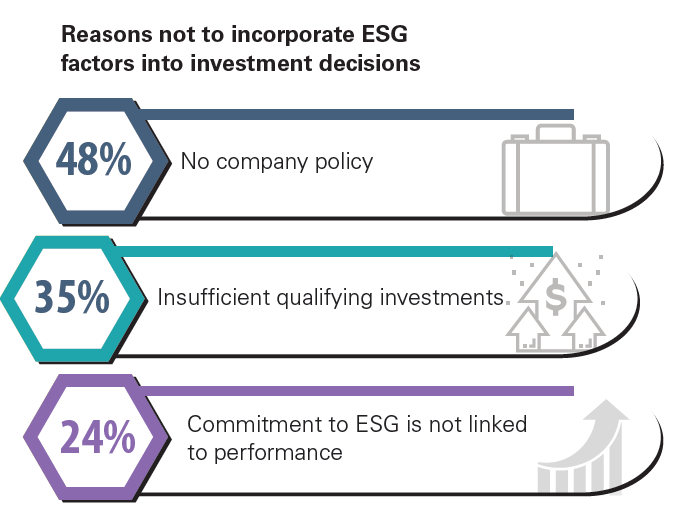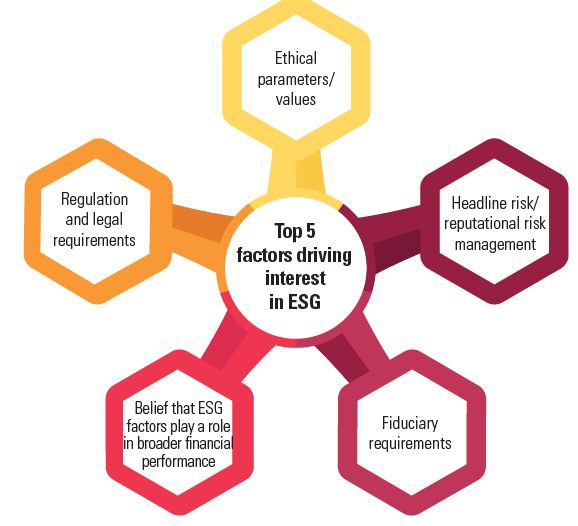Singapore’s National Environment Agency issued its first haze advisory in early August 2017 in what is now customary this time of the year. Haze from forest fires to clear land in Indonesia’s Sumatra and Kalimantan picks up during the summer, blanketing both Singapore and Malaysia. It can turn so severe that daytime turns dark and visibility drops to 50 metres.
 Despite the urgency, investors in the region are also largely still in the dark as to the need for ESG (environmental, social and governance) considerations in investing. In a survey conducted by Asset Benchmark Research (ABR) in July 2017, six in every 10 investors are ignoring ESG factors in their investment decisions.
Despite the urgency, investors in the region are also largely still in the dark as to the need for ESG (environmental, social and governance) considerations in investing. In a survey conducted by Asset Benchmark Research (ABR) in July 2017, six in every 10 investors are ignoring ESG factors in their investment decisions.According to the report, which canvassed the views of 251 asset managers including those ranked as most Astute in the local currency bond markets, 61% are sticking to traditional metrics of assessing investee entities, focusing mostly on tangible measures of a corporation’s value, such as profits and sales growth. A large minority (46%) have no plans to use ESG standards in the near-term.
Yet, Asia stands to benefit the most from a greater focus on ESG. The region is blighted increasingly by environmental challenges despite basking in the glow of being the world’s fastest growing region. Long term, the future is dim in terms of health costs and the severe and often irreversible damage to the environment.
 Real money accounts, such as pension and endowment funds, are also including ESG as part of third-party mandates. Portfolio managers could be the recipients of the flow of new money by a shift of their investment policy to reflect ESG factors.
Real money accounts, such as pension and endowment funds, are also including ESG as part of third-party mandates. Portfolio managers could be the recipients of the flow of new money by a shift of their investment policy to reflect ESG factors.Globally, there are US$22.9 trillion of assets managed under responsible investment strategies, a 25% jump from 2014, according to the biennial review of the Global Sustainable Investment Alliance (GSIA), an organization that focuses on sustainable investments. In a sign that sustainable investing is already a force across global financial markets, GSIA said responsible investments now stand at 26% of all professionally managed assets globally.
Asia trails the rest of the world. Its ESG-related investments, despite the buzz around sustainability, represent a measly 0.2% (US$52.1 billion) of total investment. This compares with 53% in Europe (US$12 trillion), followed by the US with 38% (US$8.7 trillion).

The problem runs deeper. In the ABR survey, most cite the lack of a company policy around ESG investing as the main reason they have not factored ESG principles into investment decisions. Insufficient qualifying ESG investments is another concern among Asian credit investors. “My portfolio is composed of Philippine peso-denominated bonds, both government securities and credit. The Philippine debt market has very limited ESG-qualified instruments,” says a fixed income portfolio manager at an insurance house headquartered in Manila.
A Jakarta-based trader at a local bank suggests the costs to companies of promoting ESG may also outweigh the benefits. “ESG factors are not yet a thing in the Indonesia bond market. Putting this into consideration will carry more cost into the business. But they will probably implement those at the right time in the future,” he adds.
There are still many sceptics that struggle with ESG’s value proposition. “It is not clear the extent to which ESG drives asset prices,” says a senior portfolio manager in Singapore.
Others are sold on the governance aspect, but have less faith in social and environmental measures. “Our belief is that good governance leads to better financial performance. Environmental and social factors are less material,” says a Malaysian ringgit bond investor.
Environmental regulations are raising awareness about the importance of ESG as a metric to investments, but probably not enough to drive investments based on ESG principles. Across the surveyed Asian markets, Indonesia lagged most markets in terms of ESG adoption.
Fifty-five percent of Indonesian respondents have reported that they are not currently involved in ESG strategies and none of these managers plan to be involved in the next two years. A fixed income head based in Jakarta suggests regulations could make a difference. “We need support from the regulators to make it [ESG investing] work,” she says.
Indonesia’s struggle with forest fires could be a case in point. In 2015, Indonesia suffered economically from forest fires, with the World Bank estimating damages of US$16 billion. Following the worst case of haze in recent history, banks in the region have adopted ESG concerns such as deforestation into their lending and business practices. The guidelines curbed lending to companies that engage in open burning or trade with errant operators.
Another factor in need of better standards is governance. Despite the growing awareness of the corroding effects of corruption, for example, it remains rife.
EY Asia-Pacific in a recent survey found that ethical standards in the region are not improving. Just as China pledges more than US$100 billion in financing for massive infrastructure tied to its One Belt, One Road initiative, a survey of business practices suggests corruption in Asia is getting worse. Some 63% of respondents say that bribery or corrupt practices are common in their country, up from 60% in 2015.
Compliance polices may be in place in markets including India and China, but many businesses are still tolerating unethical practices to deliver growth.
Asia also requires education when it comes to sustainable investing. In India, the majority (73%) of fund managers ABR surveyed are not adopting ESG factors into investment decisions currently. There is a lack of practical benchmarks on ESG, investors say. “ESG is a new concept here and it is still in a discussion mode. Regulators are working on it,” a fund manager explains.
But the string of corruption scandals and environmental violations by companies could be thrusting ethical growth on to the corporate agenda. India has already made some progress on the responsible investment front. Companies, as elsewhere in the region, are starting to voluntarily report some ESG data. The government has introduced guidelines on corporate governance. India is also creating a market for green finance. It was the seventh-largest green bond issuers last year with volume of US$2.7 billion.
In 2016, China led the world on green bonds, raising US$30 billion from fixed income investors that want exposure to ethical projects.
To attract more international investors, Asian stock exchanges are also seeking to boost the region’s historically weak record on ESG disclosure. Hong Kong, Singapore and Taiwan are among those requiring companies to provide more transparency of ESG performance and risks. Encouragingly, a recent study by financial services firm BDO Limited, which surveyed Hong Kong-listed companies on ESG reporting, shows that 60% were disclosing ESG data beyond the minimum standards introduced by the Hong Kong Stock Exchange.
Fifteen percent of the asset managers ABR surveyed, although they are a minority, are eyeing expanding investments based on ESG factors in the next two years.
In India, 27% of the respondents plan to allocate more cash to responsible investments. In Thailand, 23% of fund managers will be incorporating ESG factors in their investments.
Could the growth in ESG-related assets be the tide that raises all boats?
For now, ESG investing in Asia is still a small segment of the broader investment universe. But it is vibrant and growing. And change may be afoot.
Six of the 14 countries globally that developed stewardship codes since 2014 are in Asia, one independent study shows. The codes set out principles that aim to improve long-term risk-adjusted returns through engagement between investors and companies.
ESG represents good investment practice. The investors ABR surveyed say they engage in sustainable investing for ethical reasons. The use of ESG parameters in asset allocation is also driven by regulations and legal requirements, some say.
The same number of respondents also believe that ESG integration into investments is prudent. ESG factors, they note, reduce headline and reputational risks.
In Malaysia, Singapore, Thailand and the Philippines, some fund managers are responding positively to ESG investing. In Hong Kong, about 40% are into ESG-related strategies. For these investors, ESG investing makes financial sense.





.jpg)
.jpg)


